- Home
- Ian Mcewan
The Cockroach Page 5
The Cockroach Read online
Page 5
Then came the second heatwave. Tucked under a baking roof, its windows shut tight against the gritty winds, the prime minister’s apartment warmed to an extraordinary level. But Jim was energised by the moist heat. He had never felt healthier. His blood, excited and thinned, raced through and nourished his busy mind with fresh ideas. He had refused to replace Simon with a new special adviser. He had also dispensed with Cabinet meetings. Delivering Reversal was his only purpose, to which his every sinew was bent, just as he had promised in parliament. Reversalism consumed him and he no longer knew why or how. He entered a state of barely conscious bliss, unaware of time or hunger or even his own identity. He was deliriously obsessed, burning with strange passion, hot with impatient desire for explanations, details, revisions. Prompted by a dim recollection of Churchill in 1940, he appended to every written directive, ‘Report back to me today to confirm the above has been accomplished.’ These words were made available to the press. The prime minister took meetings with the heads of MI5 and 6, business and trade union leaders, doctors, nurses, farmers, headmasters, prison governors and university vice chancellors. Preferring not to take questions, he patiently explained how their different sectors would blossom in the new regime. He had regular consultations with the chief whip. It looked like the Reversalism Bill would pass easily with a margin of twenty votes or so. The PM wrote memos, issued commands, and made motivating phone calls to his ministerial team. He sent down inspirational press statements to Shirley. The civil service was now properly turbocharged; across London the lights were on all night in the ministries. And in the Downing Street apartment too. Outside, by day and night, dispatch riders lined up to collect or deliver documents too confidential to be entrusted to digital transfer.
Developments further afield were also good. A British-owned farmhouse in Provence was daubed with red paint by French patriots. The London tabloids were healthily inflamed. When the prime minister held President Larousse personally accountable, the figure of a club-wielding John Bull with Jim’s face appeared in a Sun cartoon and was widely circulated on the Internet. In the polls, Sams was up fifteen points over Horace Crabbe. In his early morning tweets, the American president described Prime Minister Sams as ‘a great man’ and announced that it was time to reverse the entire US economy. Before lunch, a thousand points were wiped off the Dow Jones. The next morning, Tupper changed his mind. He was, he said, just ‘playing with the idea’. Stock markets around the world were reassured. When the chairman of the Federal Reserve dismissed Reversalism as ‘loopy’, the President doubled back in anger. Reversalism was on again. It would bring ‘the old elite to its knees’. This time the Dow Jones was untroubled. As one Wall Street insider said, the markets would panic when it was time to panic.
It was Gloria, the young woman in the trouser suit who had come to wake Jim on that first morning, who tapped on the door late one evening to deliver the news. Simon had been found hanged by a towrope in the bedroom of his house in Ilford, where he lived alone. Even better, there was no note. He had been dead for at least a week. While Gloria went down to find some champagne, Jim wrote a quick note of praise and regret. It was good of Simon not to be writing a memoir or plotting with enemies of the Project. Gloria said her goodnight and took the warm encomium – deeply moving, everyone would say – downstairs for Shirley to type up and send out. The prime minister drank the bottle alone while he continued with his work. But his usual concentration was just a little diminished. Something was nagging at him, a little uncoiling thread of suspicion that he couldn’t quite justify. At last, he had to put down his pen to think this through. It came down to nothing more than trivial superstition that he, the most rational of creatures, could not dismiss: there had been nothing but good news lately – the exhilarating pace of work, the chief whip’s calculations, the collapse of the 1922 Committee revolt, the dead fishermen, his press, his soaring popularity, the red paint, Tupper’s praise and now this. Was he being so unreasonable when the experience of a lifetime demonstrated that any torrent of delightful fortune must at some point be checked? At the end of his rope, Simon had made the prime minister nervous. He slept poorly, worrying all night that this happy death presaged a turning point.
And so it did, the next morning, not one point but two, each turning in the same direction. The first came in the form of an early morning email from the chief whip. There was a secret cabal among his own backbenchers, a group of Clockwisers who had been meeting in a private house somewhere outside London. Not much was known about them, their numbers or their names. There were obvious candidates, but no evidence, only bland denials. They had voted with the government so far to conceal their identities. It was a mystery or a miracle, the way they had dodged the attentions of the whips’ office. But one thing was now known for sure. The foreign secretary, Benedict St John, was the moving force and it was suspected that the intention was to help the opposition defeat the Reversalism Bill when it came back to the Commons.
This ugly disloyalty was on the PM’s mind as he shaved and dressed and descended the stairs. In his fury, he wanted to hit someone, or break something. It was an effort to appear pleasant when his junior staff greeted him in the hallway. He had been too preoccupied, too complacent. He should have dealt with Benedict St John days ago. If only he was a free agent, Jim would happily have taken an axe to the man’s throat. These furious, violent thoughts did not begin to fade until he sat down to his coffee and his tight-lipped press secretary laid before him the Daily Telegraph’s double-page spread.
It was one of those leaks from within the heart of government in which the paper excelled, hardly seeming to care how this one went against the grain of its strict Reversalist line. The allure of a scoop was total. This was a well-laid-out reduction of a Royal Navy memo that revealed the Roscoff Affair to have been an accident. It was hard to doubt it: radar and satellite data, ship-to-shore intercepts, rescue divers to frigate intercepts, French embassy and Élysée Palace intercepts, and eye-witness reports. Jim read it over twice. Nothing here that Simon could ever have had access to. Among the many diagrams and photographs was a picture of himself, rain-sodden and erect on the airfield tarmac by the flag-covered coffins. The leak was a political calculation, and clearly a Clockwise-inspired attack. The source was obvious. These two bad developments were related. His enemies were on the move and Reversalism was under threat. Jim knew he had to act quickly.
Shirley’s office had already prepared a press statement. Jim read it through, deleting all hints of apology to the French. It was a decent holding position. He was giving no interviews. Essentially, the prime minister was immensely relieved to hear that what happened to the crew of the Larkin was the consequence of a tragic accident. Here, from our courageous Royal Navy, was the irrefutable proof that the French government, for reasons of their own, had been unable to provide. The terrible loss suffered by the families of the lost crew remained a matter of deep, etc…bereaved, etc. The prime minister thanked the French authorities for all their etc., etc., and wished to reassure our good neighbour that routine intercepts of their radio and telephone traffic was no more than a sincere expression of the UK’s profound esteem. Etc., etc., etc., for the Fifth Republic.
He signed off on the text and, on his way back upstairs, told his staff that he was not to be disturbed. In the apartment he locked the door, cleared papers from the coffee table and placed at its centre a large notepad and a red ink biro. He sat, hesitating, chin in hand, then began to write names, draw circles round them, link the circles with single or double lines embellished with arrows and question marks. He appraised actions and their possible consequences, their discoverability and their deniablity through the distorting prism of alliances, rupture and disgrace. His was a perfectly pitched and balanced mind, well adapted by inheritance over unimaginable stretches of time to the art of survival and the advancement of his kind. Also, a life of constant, almost routine struggle had perfected in him effortless mastery in defending all t
hat he possessed – while seeming not to. He was calm in the knowledge that he would prevail. And in this moment of scheming, he was richly self-aware, fully alive to the joy of politics at its purest, which was the pursuit of ends at all costs. He thought and calculated hard, and after half an hour it was clear to him that it was too late to commission the foreign secretary’s murder. He turned to a fresh blank page, and considered.
There were other, gentler forms of murder. Contemporary social life was a metaphorical armoury of newly purposed weapons, of tripwires, poisoned darts, land mines waiting for a careless step. This time Jim did not hesitate. It took him two hours to write his article, possibly for the Guardian, a confession of sorts that demanded of its author the trick, entirely alien to him, of inhabiting another’s mind. He persevered and within three paragraphs was already beginning to feel sorry for himself, or for the self he would have to find and cajole. Or threaten. It was an open-ended scheme. Only by writing it could it be discovered. When he was done, he walked up and down within the confined attic space in a state of exultation. There was nothing more liberating than a closely knit sequence of lies. So this was why people became writers. Then he sat again with his hand hovering near the phone. There were three names on his list. Whom could he trust? Or, whom did he mistrust the least? Even as he set himself the question he knew the answer, and his forefinger was already tapping the keys.
* * *
*
The one thing everybody knew about Jane Fish was that she smoked a pipe. Everybody also knew that, actually, she didn’t. She wasn’t even a smoker. Years ago, starting out in the humblest, most wretched, least popular job in government, secretary of state for Northern Ireland, she had attended an event in Belfast for an anti-smoking charity. She agreed to take one puff on a pipe and blow the smoke into the face of a child to highlight the dangers of secondary smoking. The little girl’s eyes were closed and she did not inhale. But public life is lived in broad strokes. The customary two-day media storm followed. Since Fish was outspoken and often in the news and had a pleasant, unexceptional face, cartoonists had no choice but to keep the pipe in her mouth. For political sketch writers, she would be forever ‘pipe-smoking Jane Fish’. She was popular. In the spectrum of available opinion, she belonged mostly in the no-nonsense faction and was well liked for her stand against breastfeeding in public. She had been a passionate Clockwiser until, respectful of the will of the people, she became a passionate Reversalist. She was admired for speaking well for both.
Of the three women on his list, she was, in the prime minister’s view, the closest to her pheromonal roots. His judgement was good. On the phone that night, when he laid out the facts, she understood immediately the need for firm action. She confided that she’d always had her doubts about Benedict. Jim had his hand-written article biked round to her immediately in a sealed pouch. She phoned back ninety minutes later with her suggested changes. Some concerned matters of historical detail, others were what she called ‘a matter of voice’. The following morning, Shirley typed up the messy manuscript and went round to King’s Cross to deliver it to and negotiate with the editor of the Guardian. The prime minister had insisted that the press secretary was to remain on the premises while the piece went into production. This was a broad-minded paper that had once run a column on its opinion pages by Osama bin Laden, and employed as a journalist a paid-up member of Hizb ut-Tahrir, an extremist organisation. It was a bit of a stretch to run a piece by Jane Fish, but how could a Clockwise paper resist when one minister was destroying another in a government it despised?
It is a wonderful sight, deeply stirring, when a great newspaper has only a few hours to get behind an important story. Immense expertise and teamwork, long memories and rapid analysis come nobly into play. The whole building hums. Shirley told her staff later that it was like being in a frontline hospital at the height of a bloody battle. The entire front page was turned around, along with three pages inside, and a leader by the editor herself. By five that afternoon, the first copies were coming off the presses. That may have been a high moment for older journalists, to hold a fresh hard copy in their hands. But it was irrelevant. By then, the paper’s website had been running the revelations, with constant updates, for four hours. Plenty of time for rival papers to pick up the story for tomorrow’s editions, and for evening television news to rejig their running orders. Social media, blogs, political webzines were on fire. The Roscoff Affair, with its niggling historical details of murders that turned out to have been mere accidents, drifted down the lists. If the prime minister had pointed the finger at the French, he was only as mistaken as everyone else. No skulduggery off the Brittany coast, but plenty here in Whitehall. A holder of one of the great offices of state was in disgrace. Where was the foreign secretary? When was he going to resign? How would the government handle the crisis? What did this mean for Reversalism? When were powerful men going to reform their ways? To this last, the prime minister had a single-word answer.
FOUR
It was 2,857 words long, and written more in regret than vengefulness. This was a tale of harassment, bullying, obscene taunts and inappropriate touching that led by turns to verbal abuse. That Fish went out of her way to stress that no actual rape took place gave her account added veracity. That the blunt, plain-speaking northerner should relate these matters with such raw sensitivity moved some to tears. Even a subeditor was wet-eyed. The appalling events related to a twenty-month period fifteen years before, when Jane Fish was parliamentary private secretary to Benedict St John and he was minister for work and pensions. She had suffered ever since, too fearful for her career, too humiliated to speak out and strangely protective of her gifted colleague. She was breaking silence now because the foreign secretary’s youngest child was eighteen and because she had come to believe she had a duty to younger women who occupied vulnerable positions like the one she once had. The front page headline was, ‘Foreign Secretary’s Shame’. A contemporary photograph showed Fish following St John onto a train, carrying his luggage. Around the body of the piece were boxed texts of explanation and analysis. In her leader, the editor deplored such vile behaviour, but cautioned against a rush to judgement. On the opinion page a younger member of the Guardian staff decreed that the victim was not only always right, but had a right to be believed.
Reading his copy of the paper that afternoon, alone in the Cabinet room, the prime minister found himself, on balance, siding with the latter. The more he read over his own work and admired the layout, the more convincing it became. He had to hand it to Jane. Such vicious, ruthless, heartless lying. Such an insult to real victims of masculine power. He wondered if he himself would ever have dared put his name to the article. Framed and confined within these pages, the story generated its own truth, rather in the way he imagined a nuclear reactor produced its own heat. Whether these things had happened or not, they might well have, they could so easily have, they were bound to have. They had! He was beginning to feel indignant on Jane’s behalf. The foreign secretary was a wretch. Worse than that, he was late.
Five minutes later, when St John was shown in, Jim was still reading the pages, ostentatiously now, pen in hand. The two men did not exchange a greeting, nor did the prime minister stand. Instead he indicated the chair opposite him. At last, he folded the paper away, sighed and shook his head sadly. ‘Well…Benedict.’
The foreign secretary made no reply. He continued to stare steadily at Jim. It was disconcerting. To fill the silence the PM added, ‘I’m not saying I believe a word of this.’
‘But?’ St John prompted. ‘You’re about to say but.’
‘I am indeed. But, but and but. This isn’t good for us. You know that. Until it’s cleared up, I need you out the way.’
‘Of course.’
There was silence again. Jim said kindly, ‘I know how it used to be. Bit of malarkey behind the filing cabinet. Different times now. Me Too and all. There’s your but. You have to go. Tha
t’s final. I need your letter.’
St John reached across the table, pulled the newspaper towards him and opened it out. ‘You were behind this.’
The PM shrugged. ‘You leaked to the Telegraph.’
‘Ours was all true. But yours!’
‘Ours is true now, Benedict.’ Jim glanced at his watch. ‘Look, am I going to have to sack you?’
The foreign secretary took out a piece of paper folded in four and tossed it on the table.
Jim spread it out. Standard stuff. Great honour to have served…baseless allegations…distraction from the invaluable work of government.
‘Good. So. Spend more time with your plotters.’
Benedict St John didn’t even blink. ‘We’re going to fuck you up, Jim.’

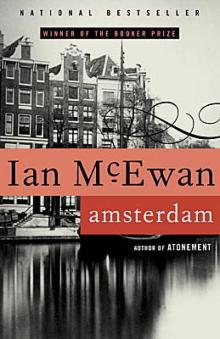 Amsterdam
Amsterdam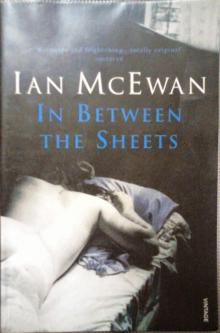 In Between the Sheets
In Between the Sheets Atonement
Atonement My Purple Scented Novel
My Purple Scented Novel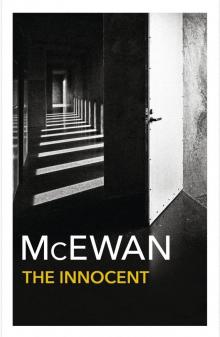 The Innocent
The Innocent The Children Act
The Children Act Enduring Love
Enduring Love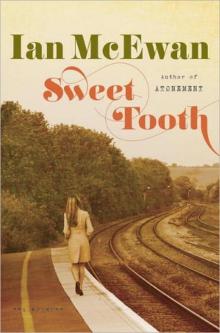 Sweet Tooth
Sweet Tooth On Chesil Beach
On Chesil Beach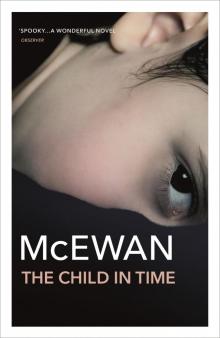 The Child in Time
The Child in Time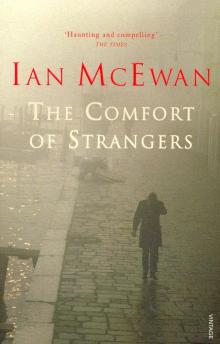 The Comfort of Strangers
The Comfort of Strangers Black Dogs
Black Dogs The Daydreamer
The Daydreamer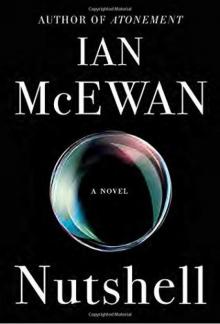 Nutshell
Nutshell The Cement Garden
The Cement Garden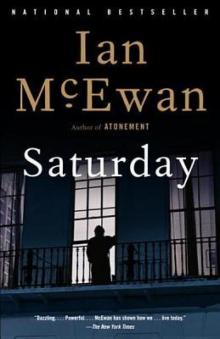 Saturday
Saturday Machines Like Me
Machines Like Me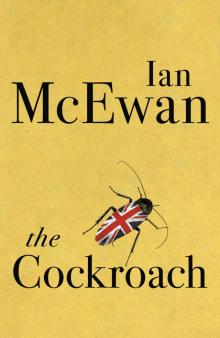 The Cockroach
The Cockroach The Ploughman’s Lunch
The Ploughman’s Lunch